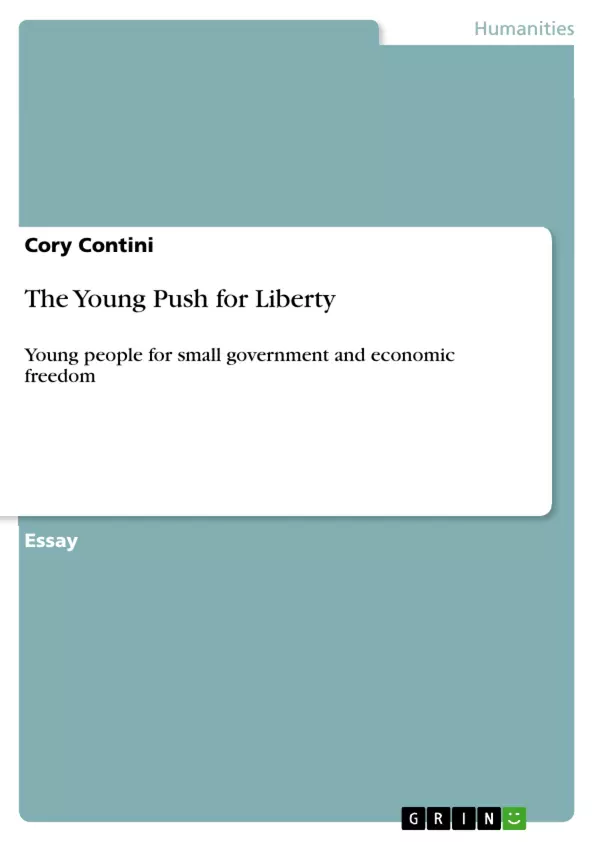Lord Acton once said that power tends to corrupt, and absolute power corrupts absolutely. Nothing is closer to the truth and this essay helps uncover this.
Inhaltsverzeichnis (Table of Contents)
- The Young Push for Liberty
- Libertarianism and the Right to Life
- The Basis of Libertarianism
- Government Power and Libertarian Principles
- Libertarianism and Individual Responsibility
- The Free Society and Libertarianism
- The Role of Government in a Libertarian Society
- The Power of Government and the Need for Change
Zielsetzung und Themenschwerpunkte (Objectives and Key Themes)
This text aims to explain the core principles of Libertarianism and its growing appeal to young people. It explores the historical and philosophical roots of Libertarian thought, focusing on the concept of individual rights and the minimal state.
- The Importance of Individual Rights
- The Role of Government in a Free Society
- The Appeal of Libertarianism to Young People
- The Relationship between Libertarianism and Classical Liberalism
- The Dangers of Government Overreach
Zusammenfassung der Kapitel (Chapter Summaries)
- The Young Push for Liberty: Introduces the Libertarian movement and its increasing popularity, especially among young people. The text highlights the movement's emphasis on individual liberty and limited government, drawing parallels to classical liberalism.
- Libertarianism and the Right to Life: Explains how Libertarianism centers around the right to life and how this right serves as the foundation for other liberties. It also emphasizes the concept of self-ownership and its implications for economic and social freedom.
- The Basis of Libertarianism: Delves into the core principles of Libertarianism, including the natural rights to life, liberty, and property, and the justification for voluntary exchange. The text criticizes involuntary taxation as a violation of these rights.
- Government Power and Libertarian Principles: Explains how Libertarianism views government's role as limited to protecting individual rights through law enforcement and defense. It argues that the government's expansion of power into areas like social welfare, marriage regulation, and capital punishment is illegitimate and harmful.
- Libertarianism and Individual Responsibility: Emphasizes the importance of individual responsibility and freedom of choice in a Libertarian society. The text highlights the harm principle and its implications for personal conduct and the role of government in regulating behavior.
- The Free Society and Libertarianism: Outlines the vision of a free society based on Libertarian principles, promoting free markets, self-reliance, and individual self-actualization. It argues that the government should not impose its vision on society and instead allow for individual liberty and free choice.
- The Role of Government in a Libertarian Society: Defines the government's limited and justifiable role in a Libertarian society, primarily focused on protecting individual rights through law enforcement and national defense. The text argues that many government programs are unnecessary and could be better handled by the private sector.
- The Power of Government and the Need for Change: Warns of the dangers of government overreach and power corruption. The text highlights the growing influence of government and the need for societal change to prevent its further expansion.
Schlüsselwörter (Keywords)
The text focuses on Libertarianism, individual rights, limited government, self-ownership, free markets, personal responsibility, classical liberalism, and the dangers of government overreach.
Frequently Asked Questions
What are the core principles of Libertarianism?
Libertarianism is based on individual rights, specifically the natural rights to life, liberty, and property, and the principle of self-ownership.
What is the Libertarian view on the role of government?
Libertarians argue for a minimal state whose primary role is limited to protecting individual rights through law enforcement and national defense.
Why is Libertarianism appealing to young people?
The movement's emphasis on individual liberty, personal responsibility, and free markets resonates with youth seeking independence from government overreach.
What is the "harm principle" in Libertarian thought?
The harm principle suggests that individuals should be free to act as they wish, provided their actions do not infringe upon the rights or safety of others.
How does Libertarianism view taxation?
Many Libertarian principles view involuntary taxation as a violation of property rights and favor voluntary exchange and private sector solutions.
- Arbeit zitieren
- Cory Contini (Autor:in), 2009, The Young Push for Liberty, München, GRIN Verlag, https://www.grin.com/document/211155



